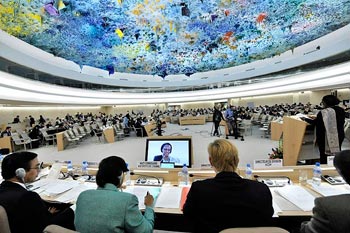GROUPS SAY SA GOV MUST BACK UN LGBTI RESOLUTION
 Human rights groups have written to the South African government insisting that it support a pending resolution on human rights, sexual orientation and gender identity at the 27th Session of the UN Human Rights Council (UNHRC) in Geneva.
Human rights groups have written to the South African government insisting that it support a pending resolution on human rights, sexual orientation and gender identity at the 27th Session of the UN Human Rights Council (UNHRC) in Geneva.
The resolution, sponsored by Chile, Uruguay, Colombia and Brazil, is a follow-up to the landmark 2011 resolution on Violence and Discrimination on the basis of Sexual Orientation and Gender Identity, which South Africa championed at the UNHRC three years ago.
That resolution led to a ground-breaking report by the UN High Commissioner for Human Rights on “discriminatory laws and practices and acts of violence against individuals based on their sexual orientation and gender identity.”
The new resolution simply calls for the Commissioner to update the report and to do so every two years. It is expected to be voted on later this week at the UNHRC.
There have, however, been troubling indications from Geneva that South Africa has not only declined to be part of the group sponsoring the new resolution but may also fail to vote in its favour or support weakening its impact.
In two letters, human rights groups have written to Minister of International Relations and Co-operation Maite Nkoana-Mashabane insisting that South Africa vote in favour of the current version of the resolution.
“Naturally a vote against this resolution would be contrary to South Africa’s foreign policy and constitutional mandate. An abstention would be seen in a similar light: a failure to speak up and show the commitment to the human rights of all people,” reads the text of one of the letters.
The groups also express concern that South Africa may support plans for a possible amendment that would cynically strip the resolution of all language on sexual orientation and gender identity.
“It is deeply concerning that the South African government has stalled on its international obligations with regard to LGBTI human rights since 2011,” commented Dawie Nel, Director of OUT, the LGBT health and well-being group in Tshwane that has signed on to one of the letters.
“The government has not only failed to host its promised regional summit on LGBTI human rights but now could be considering backtracking on its own good work. Not supporting the resolution will be a devastating blow to efforts to improve the plight of LGBTI people around the world, and in Africa in particular,” Nel explained in a statement.
He added: “South Africa’s failure to act would bolster African states that continue to criminalise homosexuality and those that plan to increase and worsen penalties against LGBTI people simply for who they love or because of their gender identity.”
The groups have called on Minister Nkoana-Mashabane to issue the appropriate directive for a vote in support of the resolution on Sexual Orientation and Gender Identity and Expression and to vote against any amendments to it. They also urged her to dissuade her colleagues from proposing an amendment that would remove references to sexual orientation and gender identity from the resolution.
One positive sign that has given human rights groups hope that the South African government will do the right thing at the UNHRC was last week’s address by Minister of Social Development Bathabile Dlamini at the UN General Assembly in New York.
In it, she expressed her “sadness” that some African countries would only agree to address sexual and reproductive health and rights “in accordance with national laws and policies.”
She asked: “How committed can one be to the rights of individuals if you still seek to do so within existing laws and policies? And, let’s remember these conservative policies and laws were in many instances imposed on us by our colonisers to deny women, children and sexual minorities the freedom to privately choose and live their sexual and reproductive lives.”
Minister Dlamini further applauded Latin American countries for “leading the world in advocating for the rights of all people without distinction of any kind.”
She said: “It is time that we as Africans lend our collective support to our Latin comrades as it is through empowering our people that we will also win the fight for the right to development and for equality between countries. Let’s take this opportunity to stop trading off the rights of our own people in the belief that it strengthens our fight for a more equal and just world.”
Here’s an update on the vote. SA voted in favour of the anti-discrimination motion.
http://www.washingtonblade.com/2014/09/26/breaking-u-n-human-rights-council-adopts-lgbt-resolution/